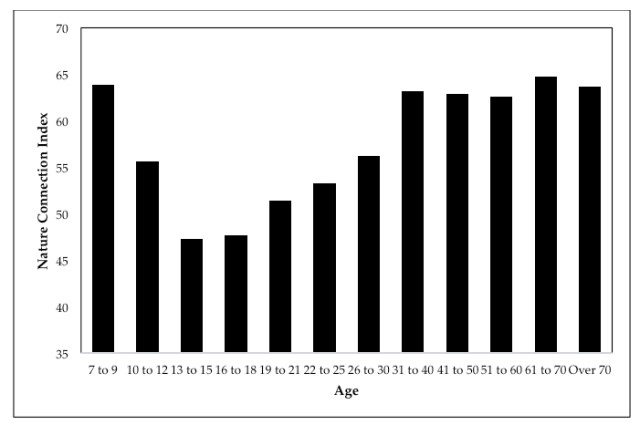Research has shown that young people's love for nature drops abruptly from the age of 11 and doesn't recover until they are 30, with significant implications for their engagement with pro-environmental behaviours like recycling or buying eco-friendly products.
These are the findings of a new study from the University of Derby, in partnership with the University of Exeter, Natural England, Historic England, the National Trust, the Royal Society for the Protection of Birds and The Wildlife Trusts. The study, led by Miles Richardson, Professor of Human Factors and Nature Connectedness at the University, analysed survey responses from almost 4,000 adults and children.

Young children are routinely fascinated by nature if exposed to it, yet interest appears to dwindle abruptly from the age of 11.
Participants rated the extent to which they agreed or disagreed with a selection of statements, to determine their level of nature connectedness: this allowed researchers to develop a Nature Connectedness Index (NCI), running from zero to a maximum score of 100. The data revealed some key insights.
The average level of nature connectedness across the population was 61, and there is a sharp dip in people's connection with nature from 11 years old, with a slow recovery by around 30. Females scored significantly higher than males – 64.21 compared to 57.96. Those who strongly agreed with the statement "I am concerned about damage to the natural environment" scored a mean NCI of 76, while those with the maximum NCI score of 100 were significantly happier, more satisfied with life and less anxious than those scoring below the maximum.
The research also provided insight into how strong nature connectedness needs to be to deliver the pro-environmental benefits required for a sustainable future. The most straightforward behaviour, recycling, was associated with an NCI of 63, just above the population average, whereas the NCI of the 5 per cent of people who gave up their time to volunteer to help the environment was 76.

The research identified that teenagers lose interest in nature at around the age of 11 (University of Derby).
Professor Richardson said: "There are a number of possible reasons for teenagers' dip in nature connectedness. Adolescence sees the move from primary to secondary school and is a time of many developmental changes, including the emotional regulation required for successful social relationships and the development of self-identity.
"Previous studies have shown that greater interest in the self, such as through 'selfie taking', is linked to lower nature connectedness. It may be that during this time of change, one's connection with nature loses relevance and importance.
"Time is tight. The data suggests a mean NCI above 70 is a minimum required to help deliver a sustainable future. That's at least 15 per cent above the current average of 61, with a 25 per cent increase to 76 associated with the meaningful attitudes and behaviours that would make a sustainable future more likely. With the right approach, nature connectedness can be increased, but ways to reach non-nature lovers are urgently needed."
No comments:
Post a Comment